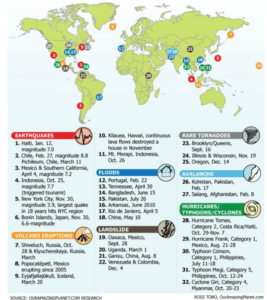Natural Disasters in the Year of the Water Tiger
If you are a little familiar with Feng Shui, you will notice that the position of the Stars this Year is the same as the Luo Shu.

The Stars are essentially in their home palaces. What does that mean? It simply means that they are pretty comfortable. Like hanging out with good friends, if the environment supports the star’s energy.
Star 5 is known as the Star of Misfortune.
I’m writing this just after the deadly Ecuadorian flash flood. I’m writing this because I want to share my thoughts on natural disasters we can expect this Year and why.
The energy of Star 5 is Earth element. We got a preview of how the Earth energy behaves in 2010 because in 2010. According to the Flying Star system, it was the Year of the Tiger, and Star 8, which is also an Earth element Star, was in the Center palace. In Chinese Metaphysics, we use lots of symbolism to understand behavior, and we pair that with the Controlling cycle of the elements. In the Controlling cycle, the Earth element controls the Water element. The symbolism is Earth attacking Water.
We know that there are lots of patterns in Feng Shui. One reliable pattern is that the energy of the Year runs on a 60 years cycle, which brings us back to 1962.
We look back on that time for clues about what we can expect this Year related to many aspects, in particular natural disasters. According to LiveScience.com – there were 6 significant earthquakes, 5 major volcanic eruptions, 7 severe floods, 6 landslides/avalanches.

We are now the Year of the Water Tiger. There is Water element in the Year, and we are likely to see flooding. Due to global warming, we’ve already heard of parts of the world where they are ‘underwater.’ There will be parts of the world where the ground is saturated with water and moisture. We know that the Fire element has been absent in previous years, so there are parts of the world where the ground is not sturdy, and landslides can occur, too. Such unstable Earth means that we can expect earthquakes, severe flooding, landslides, and avalanches.
We can expect more natural disasters of these types and passionate debates around climate change. In 2010, White House science adviser John Holdren said we should get used to climate disasters or do something about global warming. He said, “The science is clear that we can expect more and more of these kinds of damaging events unless and until society’s emissions of heat-trapping gases and particles are sharply reduced.”
The energy goes through a 60 years cycle. We know what to look out for this time around. If you live in a flood zone, be prepared. If you live in an area that has not received much rain in the previous years and have parched ground, be prepared. If you live near large water bodies, be prepared. If you live on or near major fault lines, be prepared.
Plan for the emergencies that are most likely to happen where you live!
- Be familiar with natural disaster risks in your community
- Consider how you will respond to emergencies that are unique to your region, such as landslides, volcanoes, tsunamis or tornadoes
- Some members of your household may need special accommodation during an emergency, which means planning ahead is even more crucial
For more information on disaster preparedness, go to https://www.redcross.org/get-help/how-to-prepare-for-emergencies/make-a-plan.html




 by Heart Light Digital
by Heart Light Digital